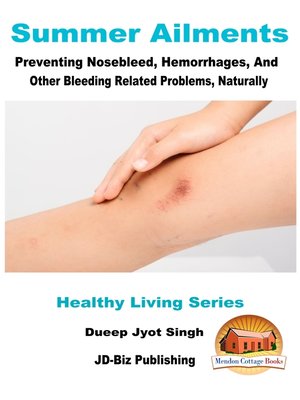Summer Ailments
ebook ∣ Preventing Nosebleed, Hemorrhages, And Other Bleeding Related Problems, Naturally
By Dueep Jyot Singh

Sign up to save your library
With an OverDrive account, you can save your favorite libraries for at-a-glance information about availability. Find out more about OverDrive accounts.
Find this title in Libby, the library reading app by OverDrive.



Search for a digital library with this title
Title found at these libraries:
| Loading... |
Table of ContentsIntroductionHemorrhage typesA Class I HemorrhageClass II hemorrhagesClass III hemorrhagesType IV hemorrhagePostpartum hemorrhageNosebleedSprainsSymptoms of a HemorrhageBasic Care/PreventionSmall woundsHow to Make a TourniquetYour DietSoupsGingerRed Sandalwood Powder and LicoriceTri-phala (Literally -Three Fruit)ConclusionSome Interesting Stories of Metals and GemsPowdered Red AlumCinnamonBananasCamphorAuthor BioPublisherIntroductionThe reason why I decided to write this particular book is because summer has not started yet, but the nosebleeds have already started in our neighborhood, because the temperature has reached the high 40s.The word hemorrhage brings with it the idea of internal bleeding, and emergency medica l situations, when you need to get a doctor fast, but actually it is the medical terminology for bleeding of any kind, both internal or external.This book is going to tell you all about different types of hemorrhages, but I am not going to give you any very complex medical remedies, except those which are in general usage for minor hemorrhages. That is because I am not a medical practitioner. Nevertheless, you can find a number of interesting bits of information in the appendix section, about how hemorrhages were cured 5000 years ago, in the Indian subcontinent, through Ayurveda.The plants and vegetables used here, along with the meat of animals and birds as well as the method of preparation is definitely interesting to read, but I really do not have the time, energy, inclination, knowledge or experience to make up any of these medicines through ancient medical procedures.The medical treatises were collected in one great compendium, and they had been taken from the knowledge gained by a large number of wandering mendicants. With my limited knowledge of Sanskrit, I could make out some medical terms, but I was astonished to know that at that time the food habits of the people living in Greece (Yavanas)– they ate meat and fish, predominantly, and Persia (Pallavas as in Reza Shah Pehlavi, the Shah of Iran – they enjoyed game, vegetables, sour foods etc., they were noted very carefully in these treatises. There were three other countries and lands noted here, but I could not make any mental association of which land they referred to.






